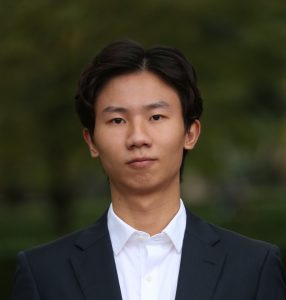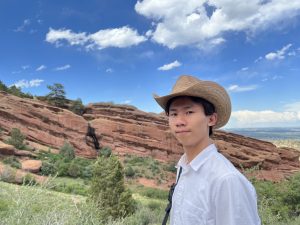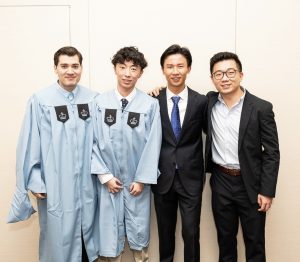Wentao Hu
 Give a man a fish and you feed him for a day. Teach a man how to fish and you feed him for a lifetime. 授人以渔 When asked to best explain the Master of Arts in Economics program, alumni Wentao Hu ’22 uses this proverb. “The program teaches you how to think as an economist– through learning how to build models, incorporate constraints, and how to optimize, which can help you in all aspects of your professional or academic career.” Hu hails from the Sichuan Province in China, a region famous for its spicy food, hot pot, and pandas. Fortunately, he did not get too homesick, fondly remembering the time he spent with friends traveling to get tasty Sichuan food in Flushing, Queens. He also admits to watching a lot of videos of pandas “to save my spirit” and “relieve stress that came from the rigorous training in the program.” Not that we need any justification to watch videos of adorable pandas. Upon starting our interview Hu warmly greets me from Beijing, laughing as he recalls that this interview reminds him of the “Associate Director asking me about my background during admissions.” However, he is in a very different frame of mind. Instead of the anxiety that he felt in 2021, he says it now “makes me a bit emotional thinking back to all of my fond memories in New York City with fellow students in my cohort.” He also has “zero regrets about deciding to attend Columbia.” After graduating with a BA in Finance from the Central University of Finance and Economics in 2021, Hu was very excited to further his academic career by going to grad school. One of the reasons Hu was attracted to the program was because of the course offerings and academically challenging curriculum, which forms a solid and systematic introduction to the world of economics. While Hu notes that Micro and Macro coursework “took countless nights out of me,” he still managed to find many opportunities to explore his new home. He reflects on some of his favorite memories of traveling around the city, such as his “unforgettable evenings in July,” as he would regularly go to Riverside Park to “enjoy the beautiful sunsets,” or go swimming with friends at Dodge Fitness Center.
Give a man a fish and you feed him for a day. Teach a man how to fish and you feed him for a lifetime. 授人以渔 When asked to best explain the Master of Arts in Economics program, alumni Wentao Hu ’22 uses this proverb. “The program teaches you how to think as an economist– through learning how to build models, incorporate constraints, and how to optimize, which can help you in all aspects of your professional or academic career.” Hu hails from the Sichuan Province in China, a region famous for its spicy food, hot pot, and pandas. Fortunately, he did not get too homesick, fondly remembering the time he spent with friends traveling to get tasty Sichuan food in Flushing, Queens. He also admits to watching a lot of videos of pandas “to save my spirit” and “relieve stress that came from the rigorous training in the program.” Not that we need any justification to watch videos of adorable pandas. Upon starting our interview Hu warmly greets me from Beijing, laughing as he recalls that this interview reminds him of the “Associate Director asking me about my background during admissions.” However, he is in a very different frame of mind. Instead of the anxiety that he felt in 2021, he says it now “makes me a bit emotional thinking back to all of my fond memories in New York City with fellow students in my cohort.” He also has “zero regrets about deciding to attend Columbia.” After graduating with a BA in Finance from the Central University of Finance and Economics in 2021, Hu was very excited to further his academic career by going to grad school. One of the reasons Hu was attracted to the program was because of the course offerings and academically challenging curriculum, which forms a solid and systematic introduction to the world of economics. While Hu notes that Micro and Macro coursework “took countless nights out of me,” he still managed to find many opportunities to explore his new home. He reflects on some of his favorite memories of traveling around the city, such as his “unforgettable evenings in July,” as he would regularly go to Riverside Park to “enjoy the beautiful sunsets,” or go swimming with friends at Dodge Fitness Center.

Wentao visited Colorado during his vacation.
Why Columbia
“Another reason I chose Columbia is that I really like big cities, they are dynamic, people focus on their jobs, and the city operates on opportunities,” says Hu. “It is called Columbia University in the City of New York for a reason.” Upon acceptance, “I was very excited, honestly, to go to NYC and to one of the top universities around the world, as well as to learn from top professors in the field,” states Hu. For instance, Wentao praises his Financial Economics course, as the course taught not just complex pricing models, but also had lessons to specifically learn how to design a trading strategy. This course was quite impactful for him as he now often deals with investment plans. While the program is undoubtedly very rigorous, Wentao urges all students to “see the big picture of the long-term benefits of the program.” This proved true in his current role as a senior associate at a top securities company in Beijing, where his mentor introduced him to colleagues as “Wentao- he went to Columbia,” something he refers to as a “humbling experience.”

Wentao and some of his friends from the cohort: Vlad, Jeff, and Jerry who nicknamed themselves “the GRM (Generalized Regression Model) Club” based on all the time they spent in Uris Hall!
MESA
Within the department, Hu developed crucial leadership skills by joining the Masters of Economics Student Association (MESA). When I asked about what led him to join MESA, Hu confessed that it started as a joke with a friend. Entering the cohort with 80 new faces, “My friend asked me ‘Do you think it’s possible to get to know everyone before we graduate from our cohort?’” “I suggested to myself, ‘Why not join MESA?’ in order to get to know people more from the cohort.’” From a simple joke, MESA ended up positively enhancing Wentao’s experience at Columbia. For one, “MESA is a big part of student life because I met so many good friends – it was a really fun time,” he recalls, “weekly socials, info sessions with alumni, holiday gatherings– special thanks to our program coordinator– and so much more.” He also used the opportunity to help his classmates. While Hu knew he wanted to go the professional route after his MA, some of his other classmates were not so sure. “I thought that I could help them out by making an information session to give more guidance,” he said. For Chinese students, he hosted a virtual event in August to help people find job opportunities in China, with more than 40 attending the session. Due to the short nature of our program, Hu says that “you’re graduating without even realizing you’re graduating,” he says. He encourages students to always think one step ahead; start to look for jobs earlier, and determine their goals for one, five, and even ten years in the future. One of Hu’s main goals while serving on MESA was to help students in the program through networking events, which proved not just beneficial for students, but also transformative for our interviewee. He learned how to cooperate with people by working with different colleagues, as well as problem-solving. “Hosting events with things that are unexpected, like an interviewee who cannot show up at the last minute, or issues with a vendor, teaches you how to work in the real-world.” These “soft skills” came in handy for Hu in his current position as in the role he often needs to talk to clients about different products and their demands.
Looking Forward
“Retrospectively, Columbia provided more than I ever expected,” recommending that future students take the initiative to get as much as possible out of the program. For instance, Wentao recommends that students take advantage of the resources available in the department by meeting with advisors often to get professional development, writing, and program support. He also urges students to talk to MESA to help them “find what you love” for a future career. Furthermore, Wentao explains that he became more extroverted during the program, causing him to change his career direction. Prior to the start of his graduate study, he thought that working in investment banking would best suit him. However, due to all of the hands-on experiences from the program, he felt more comfortable meeting new people, deciding that asset management best suited his personality and newfound confidence. In the future, he is considering going for a Ph.D. It was great sitting down with Wentao and we wish him the best of luck in all of his future endeavors! By Gabrielle Okun, Economics MA Program Coordinator

